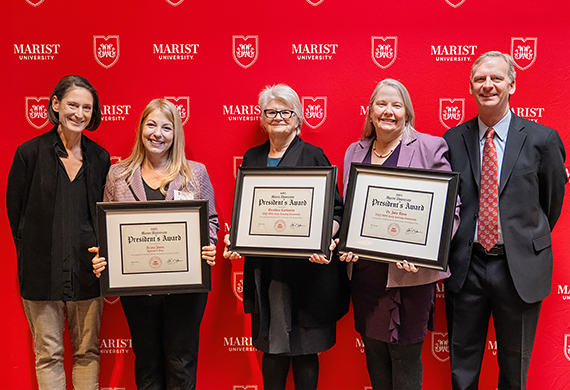Marist Authors, June 2021
June 9, 2021— Here's a rundown of new books by Marist faculty.
Dr. Philip Scepanski, Associate Professor of Film and Television, recently released his latest work through the University of Texas Press in April titled Tragedy Plus Time: National Trauma and Television Comedy. In this book, Scepanski takes a close look into how American comedies, specifically on television, address national trauma through comedy. Scepanski hopes this book can be helpful in an educational setting and for a general audience.
"Tragedy Plus Time argues that comedy's response to collective traumas in terms of popular history, emotional response, racial and ethnic identity, and so forth is an incredibly significant aspect of how we understand ourselves as Americans," Scepanski said.
Through his teachings at Marist, and specifically the course "Crisis and Catastrophe on Television," Scepanski is uniquely qualified to understand and communicate the paradigm of a national tragedy and subsequent response on television. Through his book, Scepanski relates national tragedies such as the JFK assassination and September 11 attacks to tragedy-driven comedy during those periods.
Scepanski's look at comedy on an introspective level started during his time in graduate school at Northwestern University and, in turn, allowed him to understand and explain other emotions like sadness and fear. "While in grad school, I really fell in love with trying to understand comedy, in part because it seems so inexplicable. Compared to humor, sadness and fear seem really easy to explain."
At the outset of his look into comedy following tragedies, Scepanski realized that reactions following these events do not always take the form of commonly labeled "too soon" jokes. He looked at late-night greats like David Letterman and Jon Stewart and examined their "heartfelt speeches of unity and comfort after 9/11," Scepanski said.
However, Scepanski also noted the importance of "offensive" jokes and their role in television censorship. "I also don't want to dismiss the significance of offensive humor as it is a really useful tool for understanding issues like how the television industry thinks about its audiences and what kinds of speech get limited after critical moments in America."
Tragedy Plus Time: National Trauma and Television Comedy is available on Amazon.
Finishing his walk across the United States in 2019 to raise awareness for veteran suicide and homelessness, Associate Professor of English Tommy Zurhellen released his memoir The Low Road: Walking the Walk for Veterans in April 2021.
"The Low Road is one veteran's humorous and humbling quest to find the answer to the one question everyone asks: can one person change the world?" Zurhellen said.
Commander of Veterans of Foreign Wars Post 170, Zurhellen plans to put all proceeds of his memoir towards veterans in need through his organization VetZero. "VetZero is the veteran service organization I started when I returned from the Walk Across America. Our goal is zero veteran suicides and zero veteran homelessness in our community and across the country," Zurhellen said.
The proceeds will specifically help VetZero, Hudson River Housing, and other services that help veterans in the Hudson Valley. "VetZero has partnered with Hudson River Housing in Poughkeepsie to serve all our local veterans with programs like the VetZero Ride, which offers free rides to veterans, and Liberty Station, which is Dutchess County's only veteran shelter," Zurhellen said.
Zurhellen began VetZero in collaboration with Hudson River Housing to provide a safe place for veterans in need in the Hudson Valley. Hudson River Housing believes, ". . .that those who served our country deserve the highest level of care, including quality, affordable housing. We are here to meet the needs of our veteran community through specialized housing, transportation, advocacy, and care management."
The Low Road is priced at $22 to represent the number of veterans lost to suicide every day in the United States. The Low Road can be found here.
Associate Professor and Director of Games and Emerging Media, Dr. Karen (Kat) Schrier has a new book coming out, We the Gamers: How Games Teach Ethics and Civics, in May 2021. Schrier's latest release offers insight into how games can be used in an education setting to "inspire learning, critical thinking, and civic change," as stated on the Oxford University Press webpage.
"The book is geared toward educators and how they can use games to teach skills, such as communication, problem-solving, empathy, and design. We the Gamers also explores the obstacles to learning with games and how to overcome those obstacles by encouraging equity and inclusion, care and compassion, and fairness and justice,” Schrier said.
Schrier's book examines digital games and how individuals can connect and communicate through physical games, such as card or board games. "Games come in all different genres and styles, shapes, sizes, communities, and platforms." Schrier said. “Both digital and non-digital games may have different interactions that help us to practice ethics and civics, like by fostering collaboration, communication, exploration, design, or perspective-taking."
Having published over 100 pieces of work, Schrier has become a leader in analyzing games and how they can be applicable in an education setting. We the Gamers builds on her extensive research on the power of games to support learning, including a recent grant on using VR to teach empathy.
"Games are civic communities. For instance, US President Joe Biden and Vice President Kamala Harris created their own islands in Animal Crossing: New Horizons to support their election campaign. Game players have mounted protests and town hall meetings in Fortnite, Minecraft, and Among Us," Schrier said. "Games can be used in ethics, civics, and social studies education to inspire learning, critical thinking, and civic change. But they are also themselves publics where we connect, discuss, solve problems, analyze, and discover."
We the Gamers: How Games Teach Ethics and Civics is available on the Oxford University Press website. Click here to learn more about We the Gamers.



